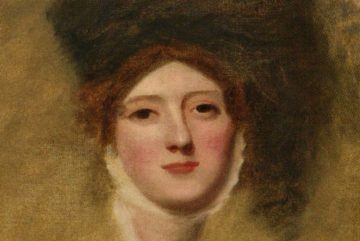Daisy Hay at the TLS:
 Not all readers will agree with the claims Miller makes for L.E.L.’s significance, but it is hard to dispute that the very ephemerality of L.E.L.’s work makes her a peculiarly appropriate spokeswoman for a literary age marked by artifice. L.E.L. came to maturity just as the voices of Shelley, Keats and Byron faded away and her life was over by the time the dominant figures of the Victorian novel made their names. Her nearest literary contemporaries were Edward Bulwer, Lady Blessington and the young Disraeli, all of whose early work shared in the neglect accorded to hers. From the late 1820s, the whiff of scandal attached to L.E.L. barred her from more respectable drawing rooms; the majority of her acquaintances were drawn from the raffish circles surrounding the Bulwers and a small circle of equally shady figures. Mary Anne Wyndham Lewis, who subsequently married Disraeli and courted scandal herself, gave her dresses and jewellery, and the art critic Samuel Carter Hall abetted her relationship with Jerdan. Jerdan himself never acknowledged the central role L.E.L. played in his emotional life, and, throughout the period in which she conceived and bore his children, he remained with his wife and legitimate children, escorting his mistress to parties before returning to the family home while she sought sanctuary in attic lodgings nearby.
Not all readers will agree with the claims Miller makes for L.E.L.’s significance, but it is hard to dispute that the very ephemerality of L.E.L.’s work makes her a peculiarly appropriate spokeswoman for a literary age marked by artifice. L.E.L. came to maturity just as the voices of Shelley, Keats and Byron faded away and her life was over by the time the dominant figures of the Victorian novel made their names. Her nearest literary contemporaries were Edward Bulwer, Lady Blessington and the young Disraeli, all of whose early work shared in the neglect accorded to hers. From the late 1820s, the whiff of scandal attached to L.E.L. barred her from more respectable drawing rooms; the majority of her acquaintances were drawn from the raffish circles surrounding the Bulwers and a small circle of equally shady figures. Mary Anne Wyndham Lewis, who subsequently married Disraeli and courted scandal herself, gave her dresses and jewellery, and the art critic Samuel Carter Hall abetted her relationship with Jerdan. Jerdan himself never acknowledged the central role L.E.L. played in his emotional life, and, throughout the period in which she conceived and bore his children, he remained with his wife and legitimate children, escorting his mistress to parties before returning to the family home while she sought sanctuary in attic lodgings nearby.
more here.
